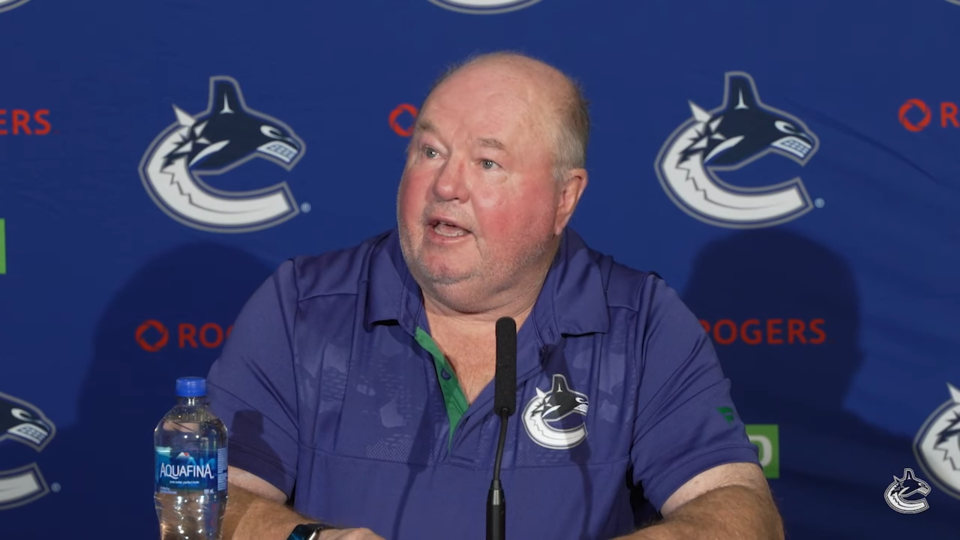Bruce Boudreau doesn’t take kindly to claims that his hockey teams don’t play with systems and structure.
In an on Sportsnet 650, Boudreau was blunt about his track record in the NHL and pushed back on the idea that his systems were behind the Canucks’ dreadful record last season.
“All I know is, I’ve won a Presidents’ Trophy, a Jennings Trophy, my teams have been number one on the power play often, number one in penalty killing, number one in defence, and we used the same system,” said Boudreau. “We can talk about structure all we want but I think it was overblown quite a bit.”
He’s got a point. Under Boudreau, the 2015-16 Anaheim Ducks allowed the fewest goals against in the NHL, with goaltenders Frederik Andersen and John Gibson sharing the William M. Jennings Trophy. The Ducks also allowed the fourth-fewest shots against in the NHL that season, so it wasn’t just about the Ducks having two very good goaltenders that season.
According to Boudreau, he was playing the same systems with the Canucks that he had with the Ducks.
"Oh my god. We've got to just survive."
Still, it’s hard to ignore the Canucks’ intense defensive struggles last season, which were only exacerbated by a long-term injury to Thatcher Demko. The Canucks constantly gave up cross-seam passes for dangerous chances, particularly on the penalty kill, where the goaltenders, including Demko before he was injured, were constantly hung out to dry.
In Boudreau’s opinion, it wasn’t about the systems.
“We just didn’t have the horses to win on a consistent basis, I didn’t think,” he said.
On the other hand, there’s the opinion of defenceman Ethan Bear, who came to the Canucks from arguably the most highly-structured team in the NHL, the Carolina Hurricanes.
“When you play for such a structured team that is so detail-oriented — there’s a plan on every single faceoff, there’s a plan on every single play when you’re on the ice — when you come from that and come to where we were at this year, it was just, like, ‘Oh my god. We’ve got to just survive,’” said Bear. “You’re just making hockey reads instead of playing a structure and it kind of felt like an every-man-for-himself kind of thing.”
"We have to play with a stronger system."
The Canucks have attempted to make “structure” a major selling point, which lends credence to Boudreau's comment about it being "overblown."
In a TV commercial produced as part of their season ticket drive, the word “structure” was emblazoned behind a still of Quinn Hughes battling in front of the net, followed by similar stills of with the words “habits” and, oddly, “standard.” While the commercial was bizarrely misguided, it’s clear that the Canucks’ pitch to fans is that things will be different next season because of a renewed emphasis on systems and the nitty-gritty details that lead to success.
Implicit in this pitch is that this is different from what came before. In other words, the Canucks under new head coach Rick Tocchet care about systems and structure, which is different from the Canucks under Boudreau.
It’s a reflection of the repeated criticisms of the Canucks’ structure under Boudreau from president of hockey operations Jim Rutherford. Those public criticisms started at the end of the 2021-22 season, when Rutherford called for more structure and said the team’s defensive zone exits were “probably one of the worst in the league,” and the criticisms continued early in the 2022-23 season.
“I didn’t like our training camp and we continued into the early part of the season the same way as our training camp was,” said Rutherford. “In order for us to become a better team, we have to play with a stronger system and really be more accountable for some of the things that some of the players are struggling with.”
In Rutherford’s view, the issues with the team’s defensive game were not about personnel but about structure.
“If we were playing in a really strong structure, it would make it easier for our defence to play and it wouldn’t matter who was on our defence,” said Rutherford. “But right now, we don’t have that strong structure and we need to change the makeup of our defence.”
Will Canucks' improvements under Tocchet last?
The public criticism from Rutherford — somewhat unheard of in the NHL — had Boudreau knowing his days were numbered long before he was actually fired.
“I think it was pretty well known that things weren’t going to work out or we wouldn’t have had that last game the way it was,” said Boudreau, referring to the outpouring of support from the fans in his final game. “Because I wasn’t fired until the next day but we pretty well all knew what was happening well before that time.”
The Canucks definitely improved under Tocchet, as they cleaned up some of their defensive issues and got better on the penalty kill, though they were helped by a softer schedule, the return of Demko, and, frankly, the absence of Oliver Ekman-Larsson due to injury.
It remains to be seen if that improvement will last next season with an overhauled defence corps that has already added Filip Hronek and subtracted Ekman-Larsson but is still very much a work in progress, particularly with Bear out to start the season after his shoulder surgery.
Perhaps it's less that Boudreau didn't have systems but that his read-heavy systems weren't the right fit for the Canucks. Perhaps Tocchet's more detail-oriented approach will work better for the Canucks. For a lot of fans, they're in wait-and-see mode — the Canucks have a lot to prove to start next season.





